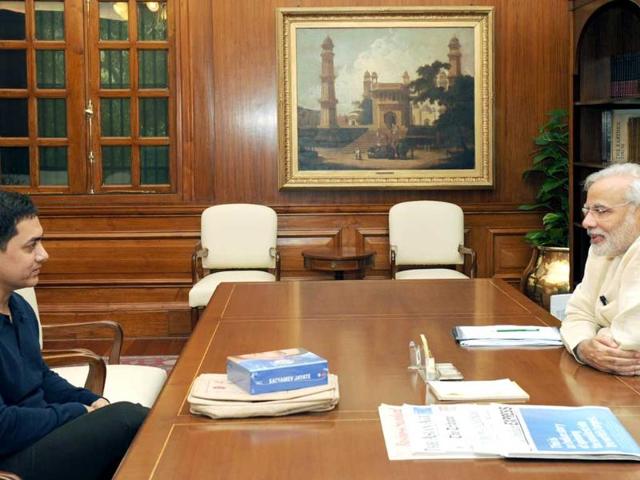Going by the book might not be a good idea
For Modi, presenting a Tagore or discussing Morita would have been an easier way of drawing out the Japanese Emperor.
But for Prime Minister Narendra Modi’s banter about how ‘secularists’ in India would look at it, his gifting of a copy of the Bhagavad Gita to the Mikado might have gone almost entirely unnoticed. The stress here is on ‘almost’ because these acts with a religious tinge have been controversial in the past too, such as the issue of whether the Indian epics should be shown on Doordarshan, a state-run entity. In the end people who wanted them to be every TV-owning home’s Sunday morning ritual won the day on interesting grounds. The reason put forward was that the epics had more to do with the collective consciousness of Indians than religion. On similar grounds, it can also be argued that the Bhagavad Gita too has much more than religious instruction, and hence giving it as a gift is fully justified. To view things from an individualistic angle, the prime minister is within his rights to give the Japanese Emperor anything he wants as long as the latter is willing to accept it. But here too some may point out that this visit was an official one and not personal, but let’s not get into that kind of sophistry.

The ‘gift’ question — when it is not an ideologically loaded matter — can be looked at from another angle. It is that of appropriateness (not in the moral sense of the word) and relevance. If one were to give a gift to one’s 75-year-old grandmother on her birthday, one wouldn’t think of a cricket bat. Maybe it could be a book, but one must know what she reads. If she is averse to reading classics, giving her a Dickens or a Tolstoy would be inappropriate. If she does not like popular stuff, even an Agatha Christie might antagonise her. One must find out what she can relate to and discuss, and in the process create bonds between the giver and the gifted. Books are not only friends, they also create friendships — between individuals as well as nations. And the internationalist in Tagore understood this well and went into the depths of life in Japan, which he compared and contrasted with that in India, in his essay Japan jatri (Japan traveller).
The poet compares India and Japan through rather simple observations. Not only do the Japanese appear to him highly artistic, they reflect their arts in their lifestyle. And the watchword for that is simplicity. He contrasts that with the extent of waste in India, which only leads to a depletion of the nation’s strength. Whoever he asked in Japan about this gave the reply: “We have received this through the medium of Buddhism… Buddhism has on one side comradeship, and restraint on the other … through the meditative compatibility of the two, we earn our strength …”
It is not that the Japanese do not get angry. They do, but do not quarrel in a loud voice. The only abusive word they use while decimating the opponent is ‘stupid’. Deep rifts take place, while the neighbour does not get to know anything. The same holds for the joys and woes of life. ‘Economy’ and ‘quietude’ define every aspect of Japan.
The shyness and hesitation in men and women getting together is much less in Japanese society than in any other part of the world. An example of that would be husband and wife bathing together. There is nothing other-wordly about the body. It is perfectly natural.
However, the celebration of Japan’s victory in a naval war with China was something that pained Tagore. War is barbarism, celebrating victory in war is even more barbaric.
Tagore is a name the Japanese are familiar with. They can relate more to Akio Morita, the Sony founder whose book Made in Japan, though bearing a resemblance to a contemporary Indian slogan, has virtually no mention of India. Presenting a Tagore or discussing Morita would have been an easier way of drawing out the Emperor or a political personage in Japan. But that calls for a bit of preparation at home.





